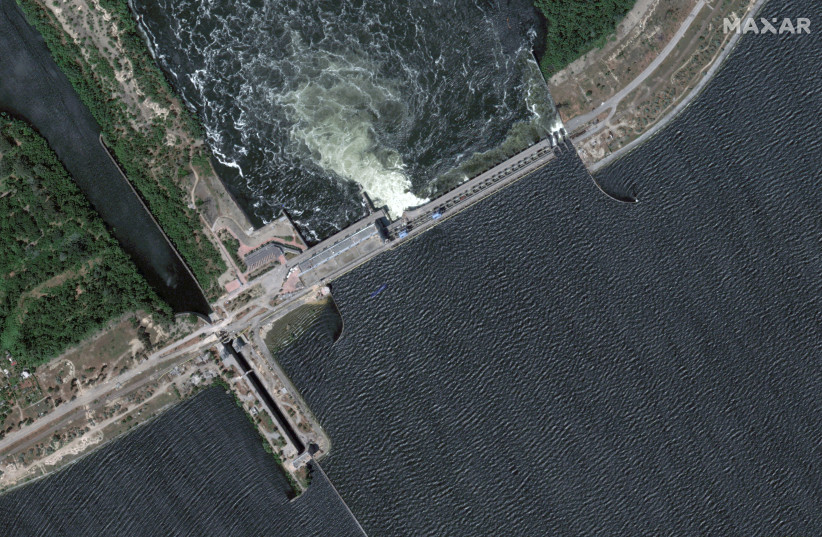The collapse of the Kakhovka Dam in Ukraine earlier this week triggered extensive flooding and forced the evacuation of thousands of people. The situation is of particular concern due to the proximity of the Zaporizhzhia Nuclear Plant, which relies on the dam’s reservoir for cooling. In response to the collapse, the International Atomic Energy Agency has acknowledged the reports of dam damage and is closely monitoring the situation. Fortunately, no immediate safety risks were identified in the aftermath of the incident.
As we witness the unfolding tragedy in Ukraine, it becomes increasingly evident that prioritizing the well-being of civilians and providing humanitarian aid is of utmost importance. Ukrainians are grappling with the consequences of both war and ecological disasters, such as the flooding resulting from the dam failure. Ukraine has accused Russia of destroying the dam, labeling it an act of “ecocide.”
However, external reports on the destruction have not definitively determined whether the dam failed or was deliberately sabotaged. In conflict zones like these, it often takes time to gather comprehensive information.
Within two days of the dam’s collapse, over 40,000 people were already affected, and this number is expected to rise significantly. Entire communities have been submerged, and numerous individuals require assistance with food and water. Additionally, large numbers of animals have been rescued and are in need of support.
The agricultural sector, which was already strained due to the ongoing war, is now under further threat. This jeopardizes the tenuous grain deal that provided some level of food security. Furthermore, reports indicate the occurrence of industrial chemical leaks caused by the disaster.

Ukraine’s president, Volodymyr Zelensky, has called upon the international community for support in the aftermath of this calamity. Israel has been supporting Ukraine with humanitarian aid since last year. In February, Foreign Minister Eli Cohen announced that Israel would provide $200 million in loan guarantees to construct hospitals in Ukraine.
Moreover, Israel has been assisting Ukraine in its efforts to establish an early warning air defense system, a critical mechanism for protecting civilian lives. Given Israel’s experience in safeguarding its own population from rocket attacks and other threats, it is well-suited to provide guidance and support in terms of technology that can detect potential dangers and allow civilians sufficient time to seek shelter.
How can Israel help Ukraine after the dam collapse?
In light of the dam collapse, it is crucial that we continue to demonstrate solidarity with the civilians in Ukraine. However, Israel must also remain cautious in navigating this conflict to ensure its own interests are not compromised. Antagonizing Russia, for instance, could have ramifications due to Russia’s presence in Syria and other geopolitical considerations.
Nevertheless, Israel shares historical ties with Ukraine, as many of the founding members of modern Israel hailed from Ukrainian regions like Odesa. The ongoing conflict poses a threat to Jewish communities in Ukraine, resulting in significant displacement since the initial crisis in the Donbas region in 2014.
The recent flooding serves as a stark reminder of the importance of resolving this conflict and placing civilians at the forefront. While the question of whether Israel will export defense-related items to Ukraine remains a sensitive matter that must be deliberated at the highest levels, we can always extend our support through humanitarian aid and assistance with defensive efforts such as the early warning system. Israel’s advanced radar and other potential technologies can prove invaluable in this regard.
Numerous small start-ups in Israel have been instrumental in the development of applications and other life-saving tools on the domestic front. Leveraging our expertise in search and rescue operations and satellite technology, we can provide meaningful support to Ukraine in the aftermath of the flooding.
Demonstrating how Israel can contribute at this critical juncture will test our resolve and enhance our experience in providing various forms of assistance, including humanitarian aid. While our country has historically focused primarily on allocating resources locally due to the threats we face, the recent diplomatic trips by our foreign minister to the Philippines and South Korea underscore our expanding global ties. As an economic and trade powerhouse, we possess the capacity to address a wide range of issues, including green technologies, climate change and environmental disasters. We should leverage that capacity to help our friends in their times of need.
